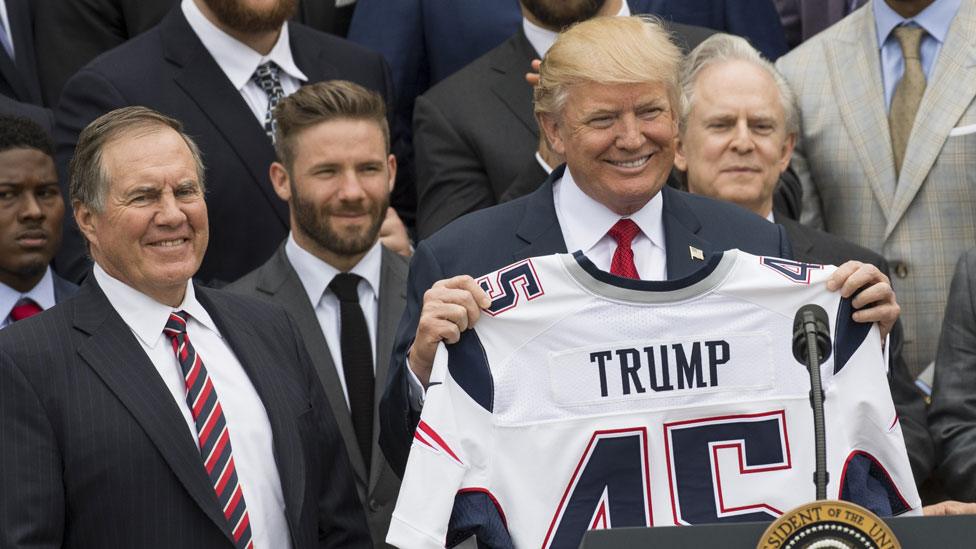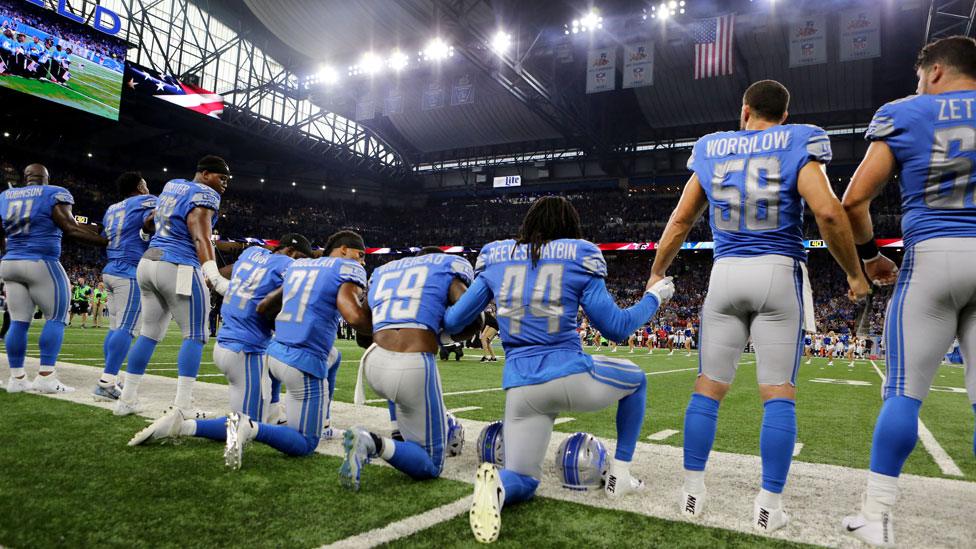What's really driving Trump in his NFL feud?
- Published
Why America's sports stars are taking a knee
President Donald Trump's swipes at the National Football League players' protests were nestled in the middle of a nearly hour-and-half-long speech at a rally in Alabama.
The crowd cheered enthusiastically - as they did for his taunts directed at Hillary Clinton, Kim Jong-Un and Senator John McCain, and boasts about his election victory and the beautiful, see-through wall he will build along the US-Mexico border.
It was the NFL comments that gained traction, however, sparking outrage and condemnation from sports stars and franchise owners. NFL games on Sunday were the setting for dozens of player protests of various kinds.
Meanwhile the president, as is his habit when challenged, leaned in to the controversy, firing off a flurry of tweets on the topic.
"NFL attendance and ratings are WAY DOWN," read one, external presidential missive. "Boring games yes, but many stay away because they love our country. League should back US."
The president seems almost to take pleasure in fanning the flames of controversy, going so far as to call for a boycott of the US's most popular sports league.
But why? Here are a few possibilities.

It's strategic
Things have been rough for the president recently.
Once again it appears that Congress is going to be unable to repeal and replace Obamacare health insurance reforms, despite the president's assurances that doing so would be "easy".
That transparent wall he touted? It currently seems more likely that the president will strike a deal with Democrats to enshrine protections for undocumented immigrants who entered the US as children - a move anathema to portions of his conservative base - than get funding from Congress to build the border barrier.
The candidate the president was in Alabama to boost, Senator Luther Strange, could go down to defeat on Tuesday, representing an embarrassing rebuke to the president from his most loyal supporters.
His approval ratings may be climbing, but there's been a lot of bad news recently - and more could be coming.
So what better way to change the subject than to restart a highly charged cultural debate about the appropriateness of political protests against the national anthem; one that allows the president, much to the delight of his base, to sing the praises of the US military and wrap himself tightly in the red, white and blue?


It's personal
Before Donald Trump was a politician or even a reality television star, he was a professional football owner. The league was the star-crossed USFL in the mid-1980s, and the team was the New Jersey Generals.
Then real-estate magnate Trump bought the team in 1984 and helped encourage the USFL, which was then playing its games in the spring, to move to the autumn, where it would go head-to-head with the NFL.
The NFL crushed, external the fledgling USFL. Mr Trump unsuccessfully tried to sue the larger league for antitrust violations, many teams went bankrupt, and the USFL eventually folded.
Fast forward to 2014, and Mr Trump had another run-in with the NFL, when he tried to buy the Buffalo Bills team. He was outbid by an energy-sector billionaire and - in a move that should now be quite familiar - took to Twitter to vent his anger.
"Even though I refused to pay a ridiculous price for the Buffalo Bills, I would have produced a winner," he tweeted, external. "Now that won't happen."
He also called, external NFL games "boring" and "too soft", adding that he was glad the deal didn't go through.
In other words, Mr Trump has a longstanding grudge against the NFL - and if there's one thing we know about the president, it's that he likes to settle old scores.


Some of the Detroit Lions dropped to their knee on Sunday
It's impulsive
When talking about Donald Trump's actions, it's often tempting to find order where only chaos exists; to ascribe grand schemes when there's an easier, simpler explanation.
The president isn't playing three-dimensional chess and devising plans within plans.
With his NFL outburst, the president could once again be reacting to events, not directing them. On Friday night he gave a long speech filled with everything that was bubbling through his mind at that particular moment.
If the media had focused on his dismissal of the Russia investigation as a hoax or his insistence that winning the popular vote in the presidential election last year would have been easy if he had tried, then that's what the president would have spent the weekend tweeting about.
Instead, here we are, on day four of a furore over players kneeling and flags flying, free speech protections and employee obligations.
If there is no grand strategy, then modern American politics is like a spinning top. There's no way of telling where it's going to go next.